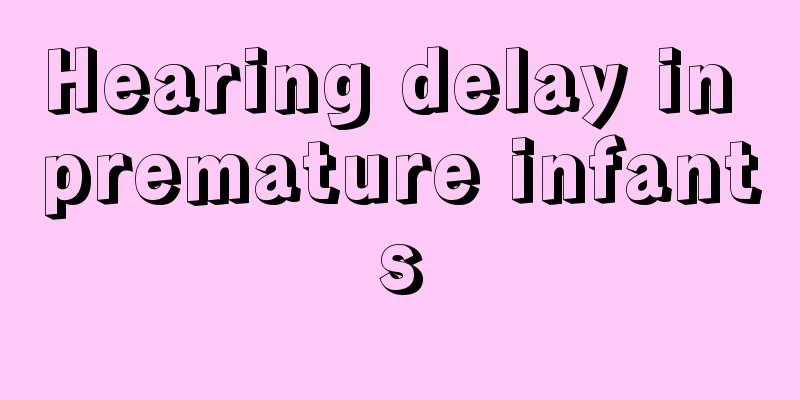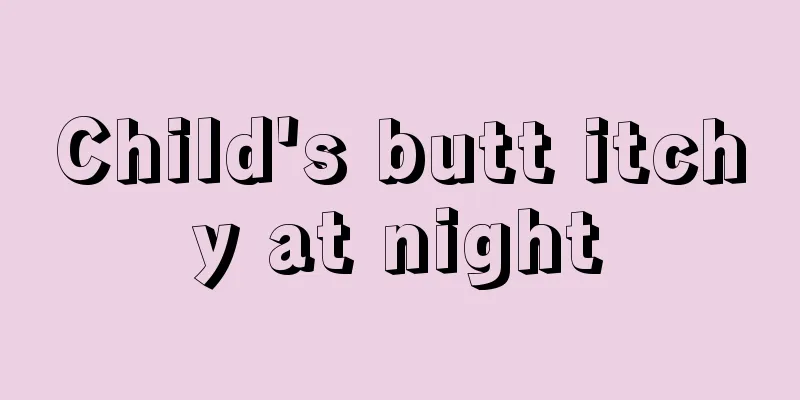Hearing delay in premature infants

|
Since premature babies are born before full term, they naturally cannot keep up with full-term babies in terms of physique and development. Of course, many newborns will have various problems due to premature birth, such as slow intellectual development or slow hearing development. So, what are the symptoms of delayed hearing development in premature infants? Below we will introduce you to the relevant knowledge about delayed hearing development in premature infants in detail. 1. Symptoms of hearing delay1. Slow auditory response He is extremely quiet when sleeping and is rarely woken by loud noises; he often does not turn around when his name is called; he responds to loud voices but ignores soft voices; he responds to the sound of clapping and closing doors but is insensitive to ringing bells; he tends to turn his head to one side when listening to sounds. 2. Speech delay At 10 months old, he still cannot make sounds such as "bababa" and "mama"; at 1 and a half years old, he still cannot say 1 to 2 meaningful words; at around 2 years old, he can only say 1 to 2 words, such as "daddy" and "milk"; some sounds are not pronounced correctly, such as "3", "4", "7", "10", etc.; he can only repeat what others say and does not understand what others are saying. 3. Daily behavior and communication He usually has a bad temper and doesn't listen to instructions; he is usually rather lonely and unwilling to communicate; he doesn't look at others when they talk to him; he has difficulty concentrating and often answers questions irrelevantly; he asks many questions in return and often turns up the volume of the TV; he often loses the beat when singing or doing exercises.
1. Let your baby listen to the rich sounds in life Rich sounds such as footsteps, door opening and closing, running water, talking, cars, airplanes, wind, rain, etc. These natural environment sounds are very beneficial for promoting the baby's hearing development.
When a mother holds her baby, it is best to hold the baby with her left hand, so that the baby is as close to the mother's heart as possible so that the baby can clearly hear the mother's heartbeat. For newborn babies, you can tie sound toys with different sound qualities or tones to the crib to stimulate the baby's hearing cells and promote the baby's hearing development. Talk to your baby softly, hum or play some music with slow rhythm and beautiful melody. Hang a wind chime on the balcony at home and let the wind blow the wind chime to make pleasant sounds. Let your baby listen to the sounds of various objects falling to the ground, such as balls, chairs, books, pencils, cardboard boxes, etc. Let your baby listen to the sounds made by various toys, such as rattles, music boxes, rubber toys, etc. Let your baby listen to bells, horns, etc. to distinguish the differences between them. Listen to the sounds of animals and let your baby identify what animal it is. |
<<: Yellow discharge in newborn baby
>>: What to do if a child has lumps of flesh on his body
Recommend
Why do children have bad breath?
If children have bad breath, it is mostly related...
What are the symptoms of umbilical hernia in infants and young children?
Among the most common diseases in infants and you...
What is the stool of an eight-month-old baby?
We all know that the baby's gastrointestinal ...
How to treat sinusitis in a 1.5-year-old baby
If a baby around one and a half years old suffers...
What causes itchy hands in children?
We all know that children are more playful. At th...
What are the preventive measures for tonsil suppuration in children?
Children are more prone to illness because their ...
What should I do if my child urinates frequently?
The physical health of young children is the grea...
What should I do if my two-month-old baby has diarrhea?
Some newborn babies have health problems, so they...
Introduction to baby fever and cold hands and feet
When a baby has a fever and has cold hands and fe...
The cause of white spots on baby's fingernails
In fact, we need to be especially careful when ta...
How to treat neonatal impetigo
Neonatal impetigo is a common disease in newborns...
What are the reasons for children's partial eating?
If a child has a picky eating habit for a long ti...
How old can a baby sit in a walker?
If the baby sits in a walker, mothers will be mor...
Baby only rolls over on one side
Generally speaking, a baby should be able to roll...
What should I do if my child has a fever?
Children have weaker constitutions and their resi...









